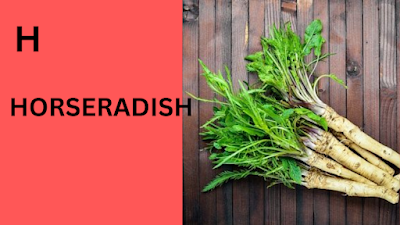8 Health Benefits of Using Horseradish in Food.
Eight Health Benefits of Using Horseradish in Food.
 |
| The image was taken from Un splash. |
In this post, I consider the following:
- Introduction and a Peek into the History
- Did you know?
- Nutrition and health benefits
- Cultivation in South Africa
- Experience with horseradish
- Conclusion
Introduction and a Peek into the History.
Horseradish is
a root vegetable initially used for medicinal purposes. Then its pungent
and tangy taste made it a choice to provide a potent and spicy relish for
cooking, particularly meat and fish items and salads. It is in the same family as
mustard and wasabi and a cousin of Broccoli, Cauliflower and Brussel
Sprouts.
It is said to
have originated in Central
Europe, where exactly has no conclusive answers, but it was in use for
3000 years for its medicinal benefits. Egyptians have used it since as
far back 1500 BC for medicinal purposes.
Did you know?
It is not the
case if you think it has anything to do with it a horse, as I have. It
got the name not because there is a horse in the roots or because it resembles
any part of a horse, or the horse eats it; it is poisonous to the horse to
eat. The horse part of it describes it as large
and robust.
The root has
been used in various cultures for medicinal purposes, and the outcome of recent
laboratory studies corroborates those benefits.
For the
benefit of those readers familiar with Malayalam, it is known as a type
of Mullanki.
Nutrition and health benefits
Nutrition contents
This tiny root includes:
- Calcium
- Dietary fibre
- Folate
- Manganese
- Magnesium
- Potassium
- Vitamin C
- Zinc.
Health benefits
1. Naturally antibiotic
- It has the natural power to kill infectious bacteria and microbes and may help against urinary tract infections.
- It can help to clear cold and sinus blockage and clear out mucus.
3. Aid weight loss
- Being low in calories and high in fibre is an excellent way to lose weight because a small portion of recipes can bring enough flavour and taste.
4. Speeds up metabolism
- Assist weight loss and improves metabolism.
5. Helps with
digestion:
- It triggers the gold bladder to release bile, the critical aspect of the digestive system and keeps your body healthy and fit.
6. Supports immunity.
- Its strong presence of antioxidants and vitamin C help produce and stimulate the white cell activities crucial to support your body's immunity.
7. Possess anti-cancer properties
8. Diuretic qualities.
- It helps urinate and cleanses your body, taking the toxin out.
Cultivation in South Africa.
Horseradish is
easy to grow in South Africa. The details you get
here.
Me and Horseradish.
I have known
it as an ingredient in the preparation of Ayurvedic oil and others as my father
was doing it. He was using it in its dried form. And the use was
strictly for medicinal purposes. Now, I know its use has become common in
Malayalam cuisines.
Horseradish
was unfamiliar to me until the present study about it. I have seen it at
Food Lovers' Market in Cape Town, our regular grocer, but I have yet to try
it. Now I feel a loss.
I read an
article in the Times
of India about a type of horseradish called Parsnip, distinct from the
kind available in Food Lovers and other literature on it. This variety I
have seen in the Chinese grocer I frequent. Once, my daughter recommended including it in food.
Conclusion:
Have you come
across the use of this versatile root vegetable as a medicine or in cuisines?
This blog is for the letter H in the series of my A2Z blog posts, lasting for the entire month and is part of the A2Z Blog chatter challenge. To read earlier posts, click on these letters. A B C D E F G

I loved reading your blog post about the health benefits of horseradish! The information you shared was informative and helpful, and I appreciate how you presented it in a clear and concise manner.
ReplyDeleteI am excited that you are keen on reading and responding to my post. Horse radish is a time-tested root vegetable, and I wasn't familiar with it though it was on top of my daughter's grocery list. The nutrition and the health benefits of the root are going to make me a fan of it.
DeleteInsightful! I don't like horseradish but this makes me want to try having it!
ReplyDeleteThank you. Yeah, if you're like me, not having a cuisine culture of eating HR, you may not like it readily, however, I am fascinated by its health benefits and am going to try it.
DeleteWow, I have only had it as a part of wasabi, and love its pungency. It sure clears up the nose. But thanks for informing that it is grown in South Africa. Who would have thought that something that is eaten with Sushi in Japan is grown in South Africa? It's like Moroccan tea for which green tea is imported from China.
ReplyDeleteYeah, Wasabi is a close relative of the HR. Yea, one thing interesting is the information revolution happening in the present time regarding the food and their nutrient values, the ready sharing of them. South Africa is a country very much adaptive to all food cultures including Sushi.
Delete